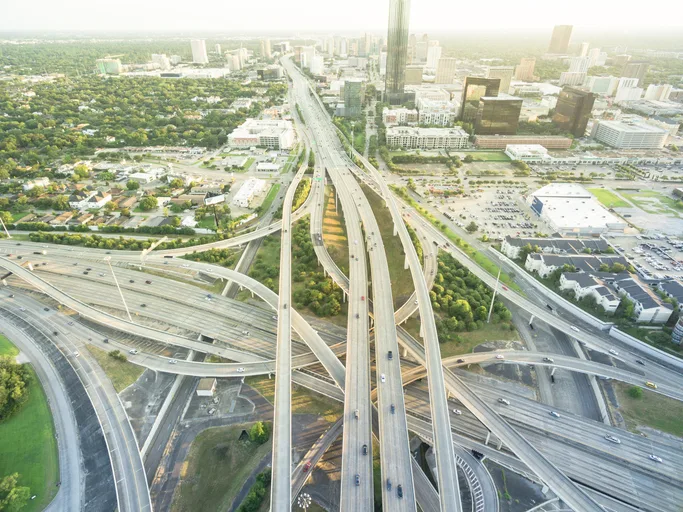
When you’re driving through Texas, it’s easy to pass from one highway to another without noticing whether it’s part of the interstate system or an intrastate highway. But in the world of personal injury law, that distinction can make a major difference, especially after a car accident. Whether you’re involved in a wreck on I-35 or a rural Texas state road, understanding how these road systems differ can help clarify legal responsibilities, accident liability, and potential claims for compensation.
Defining Interstate vs. Intrastate Highways
The terms “interstate” and “intrastate” refer to whether a highway crosses state lines or stays within one state:
- Interstate Highways are part of the nationwide Federal Interstate Highway System, created in the 1950s. These highways, such as I-10, I-35, and I-45, are designed for long-distance travel and commercial trucking across state borders.
- Intrastate Highways, on the other hand, are roads that exist entirely within a single state. In Texas, these can include state highways like SH 130 or farm-to-market roads like FM 1960. These routes are managed and maintained by the Texas Department of Transportation (TxDOT).
Understanding which type of road you’re on affects more than just your GPS; it can impact how personal injury claims are handled if you’re injured in a crash.
How Can a Highway’s Classification Affect the Outcome of Your Claim
From a personal injury standpoint, the type of highway involved in a crash can influence the cause of the accident, the parties responsible, and the legal jurisdiction. Here’s how:
1. Different Rules and Regulations Apply
Interstate highways are governed by a mix of federal and state regulations. For example, commercial trucks on interstate highways must comply with federal Department of Transportation (DOT) rules, including driver rest periods, weight limits, and maintenance inspections. If a commercial truck accident occurs on an interstate, violations of these federal regulations could establish negligence per se, simplifying your claim.
Intrastate highways, while still regulated, often follow state-specific laws. For instance, Texas has particular regulations for oil and gas transport vehicles that frequently use rural intrastate roads. If one of these vehicles causes a wreck due to poor maintenance or overloaded cargo, Texas state law applies directly.
2. Jurisdiction and Legal Venue
Interstate accidents may involve drivers, companies, or insurers from multiple states. This can complicate the jurisdiction, especially if you want to file a personal injury lawsuit. While Texas courts can often hear these cases, you may need to deal with out-of-state insurance companies or multi-jurisdictional trucking companies, which adds complexity.
In contrast, intrastate accidents are usually simpler when it comes to venue and jurisdiction. Since all parties are often based in Texas and the accident occurred in-state, the claim stays within Texas courts and follows Texas Civil Practice & Remedies Code, such as § 16.003, which sets a two-year statute of limitations for personal injury claims.
Liability and Fault in Texas
No matter where your accident takes place, Texas is a modified comparative fault state. Under this rule, an injured party may only recover damages if they are less than 51% at fault for the accident. Whether your accident happens on an interstate or intrastate highway, this rule will apply to determine how much compensation, if any, you’re entitled to receive.
This makes a thorough accident investigation critical. Interstate crashes may involve higher speeds and more severe injuries, which can bring in accident reconstruction experts, federal safety data, and complex liability chains (especially with commercial carriers). Intrastate collisions, while often more straightforward, still require careful analysis of road conditions, driver behavior, and any potential negligence by third parties such as road maintenance contractors.
Common Causes of Interstate vs. Intrastate Accidents
Common causes of interstate highway accidents include:
- High-speed rear-end or lane-change collisions
- Commercial truck accidents due to driver fatigue
- Multi-vehicle pileups in congested urban corridors (e.g., I-35 through Austin or Dallas)
On the other hand, causes of intrastate highway accidents may include:
- Rural crashes involving agricultural or oilfield equipment
- Head-on collisions on two-lane roads with limited visibility
- Failure to yield at uncontrolled intersections or highway turnoffs
While the types of collisions vary depending on the roadway, both interstate and intrastate crashes can result in serious injuries that require immediate medical attention and may lead to long-term legal claims for damages.
Contact the Texas Personal Injury Attorneys from Zehl & Associates Injury & Accident Lawyers for Help Today, Call (888) 603-3636
Whether you’re driving across state lines or just heading to a nearby Texas town, knowing the type of highway you’re on could affect everything from your legal options to how liability is determined after a crash. Interstate highways introduce federal considerations, especially with commercial vehicles. Intrastate routes are governed by Texas laws that still provide injured victims the ability to pursue justice.
If you or a loved one were injured in a highway accident in Texas, call (888) 603-3636 or send us a confidential email through our Contact Us form.
For more information, please contact our truck accident attorneys in Midland at Zehl & Associates Injury & Accident Lawyers to schedule a free consultation today.
We proudly serve Harris County, Midland County, and throughout the state of Texas. We are located in Houston and Midland and throughout the state of Texas:
Zehl & Associates Injury & Accident Lawyers – Houston
2700 Post Oak Blvd #1000, Houston, TX 77056
(888) 603-3636
Open 24 hours

Zehl & Associates Injury & Accident Lawyers – Midland
306 W Wall St Suite 701, Midland, TX 79701
(432) 220-0000
Open 24 hours